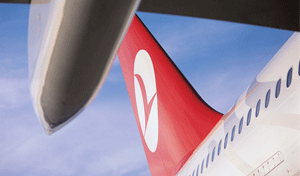Expanding Turkish Airlines Will Boost U.S. Service
 ISTANBUL -- (TheStreet) -- Turkey's continuing emergence as a world power is fueling expansion by Turkish Airlines, including more U.S. service. In April 2013, the carrier will begin four-day-a-week service from its Istanbul hub to Houston. It also has plans to serve five additional U.S. cities: Atlanta, Boston, Detroit, Miami and Orlando. Currently, Turkish Airlines flies to Chicago, Los Angeles, Washington and New York Kennedy, which has three daily flights.
ISTANBUL -- (TheStreet) -- Turkey's continuing emergence as a world power is fueling expansion by Turkish Airlines, including more U.S. service. In April 2013, the carrier will begin four-day-a-week service from its Istanbul hub to Houston. It also has plans to serve five additional U.S. cities: Atlanta, Boston, Detroit, Miami and Orlando. Currently, Turkish Airlines flies to Chicago, Los Angeles, Washington and New York Kennedy, which has three daily flights.Turkish Airlines partners with United (UAL) and US Airways (LCC) in the Star alliance, but "nobody likes to transfer between planes," said Turkish Airlines CEO Temel Kotil, in an interview. "This is why in the U.S. many passengers stay home. It helps us to be a Star member, but our target is home to home."
As a hub, Istanbul has distinct advantages. Not only is Turkey's political and business importance growing, but also the city is an attractive tourist destination. Additionally, although Kotil said passengers don't like to connect, they sometimes have to, and from Istanbul they can connect to 187 cities in 88 countries around the world -- including Mogadishu, which is not served by any other carrier. "We link them to the world and we make a profit," Kotil said. Meanwhile, key markets in Germany and France are about three to four hours away.
Kotil noted Turkish Airlines' 187 destinations make Istanbul the second largest hub in the world in terms of single carrier destinations, after Atlanta, where Delta (DAL) has 200 destinations. Dallas, where American(AAMRQ.PK) has 171 destinations, is third.
Turkish Airlines has 370 daily departures from Ataturk International Airport and carries about 80% of the traffic.
In the first half of 2012, revenue rose 36% to $3.7 billion, capacity grew by 19% and the carrier reported a profit of $90 million. Revenue per kilometer rose 24%. The fleet of 184 Boeing and Airbus planes, averaging about six years in age, has grown from 62 aircraft in 2003. The carrier is 49%-owned by the Turkish government; its shares trade on the Istanbul Stock Exchange. Shares are up about 70% this year.
Aviation consultant Robert Mann said the carrier's growth is unsurprising.
"Istanbul is a logistically important airport with all that's going on in the Middle East, and Turkish is an airline that has taken on high western standards. They have made the transition from a developing-world operation," Mann said.
While several Middle East airlines led by Emirates are also expanding in the U.S. and offer worldwide connections from their hubs, Mann noted, "If you are going to India and points beyond, or if you don't fancy landing somewhere in the Middle East, Istanbul is attractive."
A problem, Kotil said, is that Ataturk is getting cramped. Traffic grew 17% in 2011 to 37.4 million passengers, ranking 30th in the world, and comparable to Miami International, which ranks 26th with 38.3 million passengers. Planning is underway for a new Istanbul airport. "We need a bigger airport," Kotil said. "Without one, we are not able to sustain our growth."
-- Written by Ted Reed in Charlotte, N.C. www.thestreet.com
Last modified onSaturday, 06 May 2017 10:07
Latest from Admin TOA
- World Energy Council Türkiye Holds the Opening Meeting of the Young Energy Leaders (YEL’26) Program
- The Shared Pulse by Eda Uzunkara
- NEO HUMAN 10.0: How Will the Future Be Shaped? (Filiz Dag)
- Calculatit.net Is Bringing Pricing Transparency to America’s Construction Industry
- Support Independent, Trustworthy Journalism








